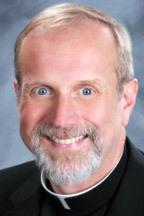

This past summer my nephews and I went to Rome for a pilgrimage. They were about to start seminary formation, and I was celebrating 25 years of priesthood.
We were able to take the “scavi” tour, which includes going to the tomb of St. Peter. The guide directed us to look at two different sarcophagi, coffins of a first-century Roman pagan and of a first-century Roman Christian. The sarcophagus of the pagan was elaborately carved with a hunting scene that showed that the person who had died liked to be a hunter. The guide told us that for the pagan, this is all that is, there is no afterlife. It was important to show that the deceased had enjoyed a great life here on earth doing what he or she liked.
The Christian sarcophagus was very plain. It had curvy lines representing the water of baptism, and it had a simple mosaic cross on it. For the Christian, death was not the end. Rather it was the beginning of eternal life.
As I was standing there, I couldn’t help but reflect on our own time. My nephews had shared with me that they had received a lot of negative questions and feedback from mostly Catholic adults who they knew; many of whom were parents of children their age. They commented to me that they had more than once had to assure or console these adults that it was going to be OK. It was striking to hear how much doubt about their decision to enter the seminary that was expressed to them by people who should have known better.
After our visit to the tomb of Peter, I asked my nephews to think about the surprisingly negative comments, questions and feedback that they had received and whether the people who had expressed them sounded more like a first-century Roman pagan or a first-century Roman Christian. It was very clear at that moment.
They sounded just like the Roman pagan who is only invested in the short time he or she lives on earth as if that is all there is, or all that really matters.
There is a real challenge in our modern society, with all its comforts and conveniences as well as a growing secularization and individualism, to actually live as the Lord has asked us: to be in the world but not of the world. We can live our lives in such a way that our religious life and spirituality are so compartmentalized and separated from life in the real world that we don’t even consider how our everyday decisions, beliefs, and practices are not informed at all by our faith lives.
Our faith ends up being what we do in church and it is not operative when we are in the world where we profess what we believe. We actually act more like functional pagans.
Over the last eight years as the vocation director of the Diocese of Little Rock, it has become very clear to me that vocations to priesthood, religious life and marriage will not grow or even become known unless everyone, every single person in the diocese, lives their faith in a complete way.
It is also true that every single vocation, no matter what it is, comes from a central and fundamental vocation of every baptized person, which is to love. Jesus teaches us that love has three principal demands. One is to love God with all that we are, to love our neighbor and to love ourselves.
Jesus also commands us to love like he does, which is to the death. A pagan cannot live this way since death is the end, and this kind of love makes no sense — only seeking pleasure and avoiding pain makes sense. For the pagan, modern society has made this way of living so much easier, depending on where you have the good or bad fortune to be born.
But for the Christian, it can be very difficult, because loving to the death means that you live for something much bigger than yourself. You live, you love, to build the kingdom of God that is not just something that we hope to experience someday in an afterlife. Precisely by loving as Jesus does are we allowed to experience that kingdom even now, and the wisdom to know that the kingdom of God goes on forever.
Religious and priestly vocations are a visible sign of the kingdom of God. But those same vocations must be nurtured in a Church that is building that kingdom through love as the Lord teaches us. That is why everyone’s vocation matters, and everyone’s vocation must be lived faithfully and visibly every day if the people of the Diocese of Little Rock want priestly and religious vocations.
Msgr. Scott Friend is the vicar general and vocations director for the Diocese of Little Rock.
Please read our Comments Policy before posting.
Article comments powered by Disqus What the Catholic Church teaches about purpose for work
What the Catholic Church teaches about purpose for work
 Three Catholic High seniors sign to discern priesthood
Three Catholic High seniors sign to discern priesthood
 Speaker educates clergy on same-sex attractions, gender
Speaker educates clergy on same-sex attractions, gender
 I knew in fifth grade Jesus was my best friend
I knew in fifth grade Jesus was my best friend
 St. Joseph a model of solidarity with immigrants
St. Joseph a model of solidarity with immigrants
 Two gifts after Jesus’ death: Virgin Mary and Eucharist
Two gifts after Jesus’ death: Virgin Mary and Eucharist
 Why we have an altar, and not just a communion table
Why we have an altar, and not just a communion table
 Pope: Wars should be resolved through nonviolence
Pope: Wars should be resolved through nonviolence